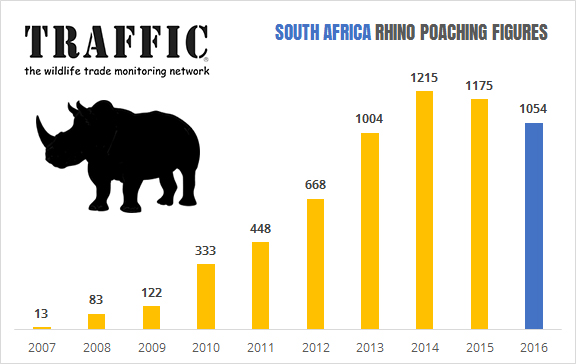Rhino Poaching Down but Still Not Sustainable
South Africa has announced that 1,054 rhinos were killed illegally in the country during 2016. The figure represents a slight drop on the previous year’s 1,175, itself a fall from the 1,215 record total in 2014.
Although official poaching figures are still awaited from some other rhino range countries, unofficial figures suggest there has been a drop in rhino poaching elsewhere, in particular Namibia where numbers fell from 94 in 2015 to around 60 animals in 2016.
The Africa-wide total for 2016 looks set to be fewer than the record total of 1,342 animals poached in 2015 when the decrease in South Africa was more than offset by significant increases in Black Rhino poaching in neighboring Zimbabwe and Namibia, the far more endangered of Africa’s two rhino species.
Kruger National Park, where the heaviest poaching losses have occurred previously, reported 662 rhinos illegally killed in 2016, a significant drop from 826 in 2015.

“Although the numbers appear to be moving in the right direction, it’s simply not possible to regard the sustained poaching of three rhinos each and every day as anything less than a continuation of the crisis,” said Tom Milliken, environmental group TRAFFIC’s Rhino Programme Leader.
Throughout 2016, various actions to enhance patrolling and law enforcement efforts against trafficking syndicates in source countries in Africa have occurred, but improved detection, arrest and prosecution of traffickers, and efforts to reduce the demand for horn in destination countries in Asia, particularly Vietnam, still have a long way to go, he says.
During the 17th Conference of the Parties to the Convention on International Trade in Endangered Species of Wild Fauna and Flora (CITES), held in September 2016, pressure was maintained on two of the countries most heavily implicated in the illegal rhino horn trade: Mozambique as a transit and exit point for horn leaving Africa and Vietnam as the principal end-use destination, which was instructed to implement their reform of the penal code effectively and to take action to reduce the demand for rhino horn in domestic markets.
“History will reveal whether 2016 marks a turning point in the fortunes of Africa’s rhinos, but right now there is little evidence either Mozambique or Vietnam have taken the necessary actions for a decisive blow against rhino horn trafficking and consumption in their countries,” said Milliken.
The illegal wildlife trade is valued at between $5-20 billion per year. It is the fourth most lucrative global crime after drugs, human and arms trafficking.
Industry Takes Action
Earlier this year, COSCO Shipping Lines became the latest shipping line to make a stance on the illegal wildlife trade, saying: “We, as signatory member to the United for Wildlife Transport Taskforce Buckingham Palace Declaration, recognizing the devastating impact of illegal wildlife trade, will NOT knowingly facilitate or tolerate the carriage for illegal wildlife trade and will not accept cargo booking for any illegal wildlife related products.”
United for Wildlife was created by The Royal Foundation of The Duke and Duchess of Cambridge and Prince Harry of the U.K. One of United for Wildlife’s commitments is to work with the private sector to reduce trafficking, and the organization has established a Transport Taskforce.
As private sector businesses across the entire trade chain may be drawn into the illegal wildlife trade unwittingly, the Taskforce is a way of enabling companies to identify any role they play in the illegal wildlife trade and to look at the ways that the sector can break the chain between suppliers and consumers.
Taskforce members include:
African Airlines Association
Air China Cargo Co. Ltd.
Airports Council International
Baltic and International Maritime Council
China COSCO Shipping Co. Ltd.
China Post Group Corporation
Chinese Wildlife Conservation Association
Convention on International Trade in Endangered Species of Wild Fauna and Flora
Cruise Lines International Association
Danish Shipowners Association
DHL Express UK & Ireland
DLA Piper
Dubai Customs World
DP World
Emirates Airline
Etihad Airways
Hamburg Sud
International Airlines Group
International Air Transport Association
International Association of Dry Cargo Shipowners
International Chamber of Shipping
International Maritime Organization
James Fisher Everard
Japanese Shipowners’ Council Ltd.
Kenya Airways
Liberian Shipowners’ Council Ltd.
Maersk Group
Qantas
Qatar Airways
South African Airways
Stena Line UK
Stolt-Nielsen Ltd.
Sustainable Shipping Initiative
TRAFFIC
UK Chamber of Shipping
UK Foreign & Commonwealth Office
United Nations Development Programme – Global Environment Facility
Wildlife Conservation Society

that matters most
Get the latest maritime news delivered to your inbox daily.
World Customs Organisation
World Wildlife Fund – UK
